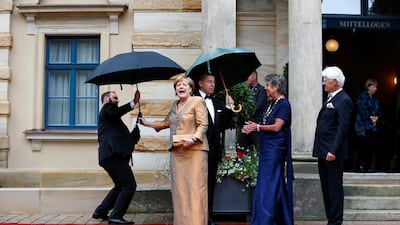There is a sudden air of inevitability about European politics and leadership. Not coincidentally, Angela Merkel, the long-serving German chancellor, is at the fore.
There are seven weeks until Mrs Merkel faces a general election and the rituals of her reign are being meticulously observed. Late last month, dressed in imperious silk-satin, she attended the south-west Bayreuth music festival. It is a homage to the composer Wagner and the summer playground of the centre-right establishment.
Soon after, Mrs Merkel went walking in the Italian Alps where, unkind newspapers noted that she has worn the same red plaid shirt for the last seven years.
What is so remarkable about the unremarkable? It is that Mrs Merkel is set to stroll back into office without breaking her stride. It would take a miracle to unseat the woman who has led Germany since 2005. In fact, if current polls hold true, it is likely she will be able to abandon the grand coalition with the left and govern in a more cohesive liberal-conservative alliance.
The election of Emmanuel Macron as French president undoubtedly helped restore confidence by slaying the spectre of a far-right leader in Paris.
Another boon is the rise from the political deathbed of the liberal Free Democratic Party. It crashed out of the Bundestag at the last election, but is on course to come back as Mrs Merkel’s coalition partner.
Under a new leader, the socially liberal, fiscally hawkish faction has found its voice. In his thirties and a serial entrepreneur, Christian Lindner would be Mrs Merkel’s foreign minister.
A government between the two would mark a return to orthodoxy but with fresh energy. By inclination, Mr Lindner is a risk taker and the likelihood is a fourth Merkel government would be bolder both within Europe and on the global stage.
It is unwise to be too complacent in these troubled times. Since the 2013 election, Germany has absorbed more than 1 million new residents. The door may have shut on the Willkommen policy, but the historic events of 2015, with its influx of Syrians and Iraqis, cannot be a footnote in this election.
The far-right Alternative for Deutschland (AfD) soared to 15 per cent in the polls at the apex of the open door policy.
________________________
Read more
How London is deserting the Conservative party
France has seen 271 jihadi militants return, minister says
Britain willing to accept a £36bn Brexit divorce bill
________________________
When the borders were reinforced, it slumped again. Having chosen anti-immigrant fear-mongering as its political platform, it is trapped. It cannot, it seems, go back to its previous agitation against the Euro. As Marine Le Pen found in France, people might not like the common currency, but they fear the harm quitting could inflict.
Provocation from within and outside the migrant population is a danger factor that could yet shoehorn the AfD into the German national parliament. A succession of stabbing incidents in second-tier German cities this summer demonstrates that the kindling is there should an incendiary moment arrive.
Assumptions could also be upended by broader social angst. The British election demonstrated that voter discontent with the structure of Western societies remains potent.
Prosperous and export-driven Germany should, in theory, be immune from the vapours that have convulsed the United States and Britain. After all, German is the home of an extraordinary pact between workers and corporations that has, for decades, caused employee wage restraint to anchor industrial competitiveness.
Yet there is a feeling that there is a canker at the root of the German economy. Most obviously, this is manifest in the car industry. Critics say this massive cartel has the country’s politicians in its pockets and has skewed the economy in its favour to the detriment of the population.
A summit of the car makers and officials in Berlin last week was the focus of a backlash. Diesel, the fuel of choice for German engines, has become the “killer on city streets”.
In this unfolding scandal, there is an opportunity for an alternative alliance to emerge as a genuine challenge to Mrs Merkel.
The junior coalition partner, the Social Democratic Party, does not see itself as a supplicant, but as a rival for power. The Greens and the far-left see the car industry as the bulwark of an economic system they wish to overthrow. United by a cause, their supporters could rally behind Martin Schulz, the jackanape resembling the SPD leader.
He only recently returned to German politics after spending most of his career in the European parliament. Mr Schulz hopes to provide an upstart challenge of the type Jeremy Corbyn, the outsider leading Labour in Britain, used to jolt politics away from its predictable track.
After a blip higher in the polls, Mr Schulz has fallen back. But the election contest is not yet out of the starting blocks. The outcome of the clashes on the campaign trail cannot be easily written off in advance.
Mrs Merkel may be about to discover what is well-known to dramatists. The fourth act is often the trickiest to set up.


